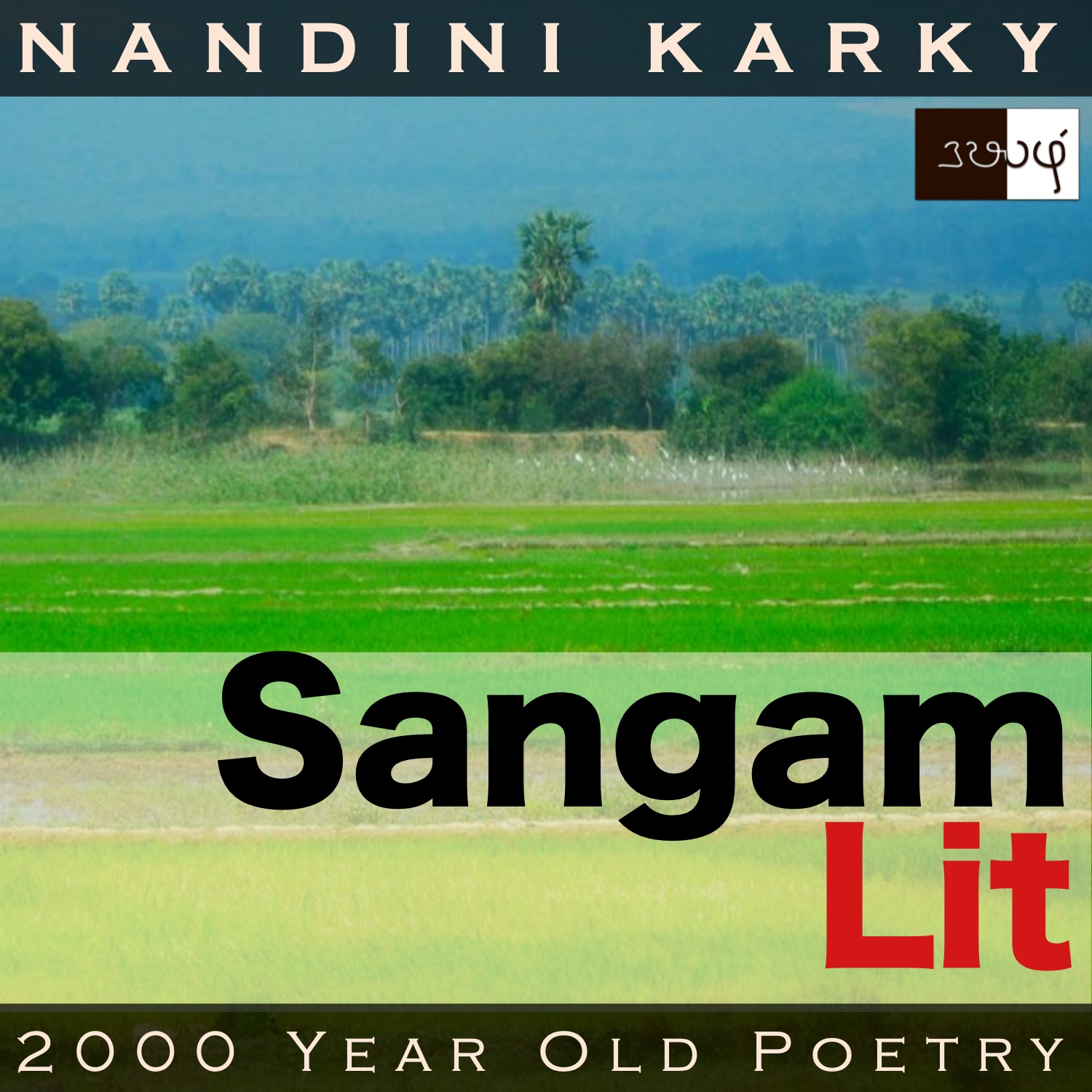Podcast: Play in new window | Download
Subscribe: Apple Podcasts | Spotify | Amazon Music | Android | iHeartRadio | Email | TuneIn | RSS | More

In this episode, we listen to a strong refusal, as portrayed in Sangam Literary work, Kurunthogai 384, penned by Orambokiyaar. The verse is situated in the farmlands of ‘Marutham’ and speaks in the voice of the confidante to the man, denying him entry to the lady’s house.
உழுந்துடை கழுந்தின் கரும்புடைப் பணைத் தோள்,
நெடும் பல் கூந்தல், குறுந்தொடி மகளிர்
நலன் உண்டு துறத்தி ஆயின்,
மிக நன்று அம்ம-மகிழ்ந!-நின் சூளே.
‘Your promises are absolutely amazing’ says a voice in this verse! The opening words ‘உழுந்துடை கழுந்து’ meaning ‘the rounded portion of a pestle used to split black gram’ conjures before our eyes an important tool, still in use in the villages of India. A marker of feminine beauty in Sangam times appears in ‘நெடும் பல் கூந்தல்’ meaning ‘long and thick tresses’. In ‘துறத்தி ஆயின்’ meaning ‘if you are to forsake’, an if-then clause raises its head. Ending with the words ‘நின் சூளே’ meaning ‘your pledge’, the verse intrigues our curiosity.
What could be that absolutely amazing promise? The context reveals that the man and lady were leading a married life when the man took to keeping the company of courtesans. This action angers the lady, as can be expected. Later, the man wanting to appease his wife, returns home. To him, the confidante says, “Akin to the front end of a pestle used to break black gram, are those bamboo-like arms, painted with sugarcane patterns, belonging to these maiden wearing small bangles, and who are adorned with thick and long tresses. After savouring their beauty, you have now forsaken them, O lord. Your vows are very fine indeed!” With these words, the confidante refuses to allow the man back int the lady’s house by saying that his promises were not dependable.
Time to explore the nuances in this tiny verse. The confidante starts by talking about a food processing tool, the ancient version of a grinder, a stone pestle with a bulging front end that was used to break black gram. Why were they breaking the black gram? Could it be to prepare a food ingredient or to make some other product out of the same? While we know not the reasons for that, we do know why the pestle is mentioned here. This is to place the pestle in parallel to the arms of a maiden. Today, if you were to say to a girl, ‘you have arms like a pestle’, a pestle or its equivalent would come flying to your head! However, in those days, having fleshy arms seemed to be a matter of pride and was often complimented upon.
Adding further details about how patterns of sugarcane are sketched on those fleshy arms, the confidante gives indication of the art of ‘thoyyil painting, wherein women adorned their shoulders and arms with intricate designs. Moreover, these same maiden have thick and long hair and are wearing small bangles, the confidante adds. These women so elaborately described are none other than the very courtesans the man has been courting, after abandoning his beloved wife. The confidante concludes with the words that if the man were to abandon those courtesans after being with them, his words were totally believable indeed.
Herein is an ancient demonstration of that intricate aspect of writing – sarcasm! ‘So fine’, ‘so believable’ – When the confidante says these words, she means that it’s on the other end. A sharp way of asking the man how his words of appeasement to the lady now are to be trusted when he has both failed in his promise to the lady to never part with her, and also his promise to the courtesans to be with them always, just so that he can relish their company. Declaring the man is not trustworthy, the confidante denies him entry to the lady’s house. In a few lines, perspectives on beauty, changes after marriage, and most of all, the art of sarcasm has been etched with precision and style. Yet again, Sangam poets show it’s not the number of words but the density of thought that matters!




Share your thoughts...